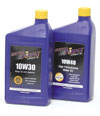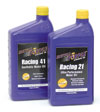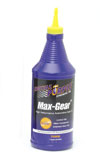Synthetic Oils And The Rotary Engine

Racing Beat has been using synthetic oils in our racing engines since the 1970's.
One question we received often is, "Can you use synthetic oil in a rotary engine?" The official word from Mazda is that they do not recommend the use of synthetic oils in their rotary engines - specifically addressing this issue in the "Owner’s Manual". If you are considering using synthetic oil in a rotary-powered vehicle that is covered by the factory warranty, take this warning seriously. On the otherhand, oil-related engine failures are very rare and tracking the specific cause of a failure to the engine oil is difficult.
In 1979, Racing Beat began testing and using Amsoil synthetic lubrication products. Without a doubt, synthetic oils do perform well in extreme heat (over 300° F) and extreme cold (below 32° F), but by the nature of Mazda’s rotary engine, the oil temperature never exceeds 250° F without severe engine damage due to other factors. In Southern California (where the Racing Beat shop is located), we have difficulty seeing the low-temperature benefits: however, when we put synthetic lubricants in the engine, transmission, and differential in our IMSA GTU race car, we immediately saw what we later found to be a common result: The oil temperature in all three locations dropped 5 to 10° F for the same operating conditions. This is apparently due to two factors: reduced friction between sliding surfaces, and reduced foaming. As we continued to use synthetic oil products it became clear that they genuinely reduced wear.
In the late 90’s, we began testing Royal Purple Synthetic Oil. In the very first test, this oil added more than 1% HP on a highly developed race engine. Since then, we have been using Royal Purple Synthetic Oils and have seen similar improvements and more in other applications, along with low wear and reduced operating temperatures.
We have noted three concerns with synthetic oils:
1. Higher cost vs mineral based oils.
2. The fact that it inhibits break-in due to the extremely high lubrication qualities (so use mineral oil during a break-in period, then switch to a synthetic).
3. There is the potential for problems if you change to synthetic oil after years of using mineral oil in an older, high-mileage rotary engine. These problems are two-fold. First, synthetics sometimes cause rubber seals to swell after years of immersion in mineral oil, and second, synthetics tend to be high-detergent by their nature, so changing to synthetics after many years of mineral oil use can cause beneficial sealing carbon deposits to be scoured away, leading to higher oil consumption.
We believe that these are some of the reasons that Mazda does not recommend synthetics - even though their race teams have used them! Royal Purple Co has prepared a FAQ page addressing many of the most common questions regarding this topic, follow this link for more information.
Copyright 2007-2024 Racing Beat, Inc ©




